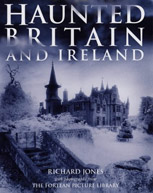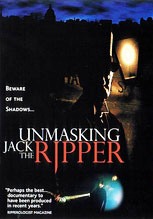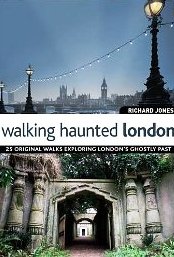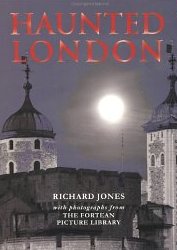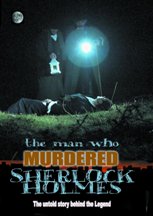A TRUE GHOST STORY TO CHILL THE BLOOD
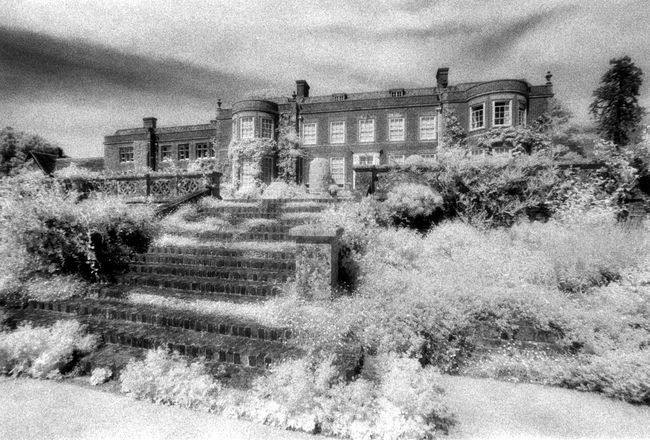
Hinton Ampner Manor
Photo By John Mason, The Haunted Realm
Hinton Ampner Garden, Bramdean, Hampshire.
Driven Out By The Ghosts
Designed by Ralph Dutton, 9th and Last Lord Sherborne, Hinton Ampner Garden is regarded as one of the great gardens of the 20th century.
Although the house is worthy of a visit, it is to a previous property, which stood some fifty yards from the current building, that the ghostly occurrences belong.
The Stewkelay family had owned the house since the end of the 16th century, and by the mid 18th century it was in the possession of Edward, Lord Stawel who had married Mary Stewkelay, a woman ten years his senior.
When Mary died in 1740 Edward took up with her much younger sister Honoria, and local hearsay was rife that they had had a child, although the infant mysteriously disappeared soon after birth.
Whatever the child’s fate, Lord Stawel was widely regarded in the district as a 'notorious evil liver,' and, when his mistress died in 1754, the gossips considered her death retribution for the wicked and debauched goings-on to which she had been privy.
There suspicions seemed well founded when a year later Lord Stawel himself died from a sudden fit of apoplexy in the Parlour of Hinton Ampner House.
Over the next ten years the house acquired a sinister reputation.
Locals whispered in hushed tones of strange sounds heard echoing from within its walls in the dead of night, and of the figure of a gentleman in a drab-coloured coat who was seen standing in the moonlight, his hands behind him in the manner favoured by the late Lord Stawell.
By the end of the decade it was well known that the house was haunted and locals shunned it at night, whilst servants often left after a short period, citing the ghostly going’s on as their reason.
Unperturbed by its reputation, a Mr and Mrs Ricketts rented the house in 1764 and set about turning it into a respectable family home.
But no sooner had they moved in than the supernatural occurrences increased dramatically.
Doors were slammed violently in the early hours of the morning and agitated footsteps were heard stomping through rooms.
Convinced that some of the villagers had acquired spare keys to the house, Mr Ricketts changed all the locks, but to no avail - for the strange occurrences continued and the family came to accept that they were living in a haunted house.
In 1769 Mr Ricketts was called away to his estates in Jamaica and his wife and children were left to face whatever entities were on the prowl in the haunted house alone.
No sooner had he left than the ghostly goings-on showed a severe upturn and one by one their servants, resigned their positions.
Mrs Ricketts herself frequently heard the invisible rustling of a woman’s skirts and, on one occasion, was woken by the distinct sound of a man’s heavy footsteps approaching her bed.
In addition she would often hear a disembodied shrill female voice that would be joined by two equally nebulous male voices, yet despite the fact the spectral conversation was going on right next to her, she could never catch a word that was being said.
Shortly afterwards Mrs Ricketts was visited by a close friend Mrs Gwynne and she too became familiar with the ghosts.
One night Mrs Ricketts was scared half out of her wits by "a most deep, tremendous noise, as if something was falling with great velocity and force" onto the lobby floor adjoining her room. This was followed by "three dreadful shrieks that grew fainter and fainter as they appeared to sink into the floor."
It was decided that something must be done and Mrs Ricketts enlisted the assistance of her brother, Captain John Jervis, who together with his friend Captain Luttrell, set out one night to confront whatever entities were roaming the house.
Having explored every room and examined every possible hiding place, the two men armed themselves with pistols and settled down to watch and wait.
Moments later they heard the sound of dreadful groans, and Captain Jervis felt something flit past him.
The sounds continued and appeared to be coming from the floor directly above them, so the two men rushed upstairs and commenced a vigorous search of the premises, but nothing was discovered.
The next morning Captain Jervis declared that the house was an unfit residence for any human being and shortly afterwards Mrs Ricketts and her children moved out.
A Mr Lawrence took over the tenancy but he suddenly quit his occupation and after that the house was left empty until, in 1797, it was pulled down.
No sooner had workmen commenced the demolition than under the floor of the lobby they uncovered a box containing a pile of bones and what, according to some witnesses, appeared to be the skull of a baby.
Unfortunately no professional opinions were sought as to whether or not these could be the remains of the infant whom the local gossips had long maintained was the fruit of Lord Stawell’s illicit union with his sister-in-law, Honoria.

